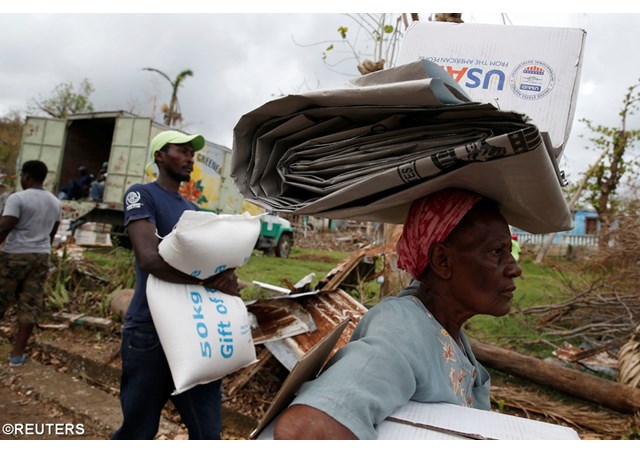
Caritas makes urgent appeal for hurricane victims in Haiti

(Vatican Radio) Hunger, homelessness and the threat of a new cholera epidemic. These are just some of the most critical needs facing the people of Haiti in areas devastated by Hurricane Matthew at the end of September.
More than 900 people died as a result of the storm, which also passed over Cuba, the Dominican Republic, the Bahamas and St Vincent and the Grenadines, before heading to the U.S. Florida coast.
Michel Roy, secretary general of Caritas Internationalis will be in Haiti from October 21st to 25th, visiting the worst affected areas of Les Cayes, Jérémie and Nippes in the west of the country.
The global Catholic aid and development confederation is launching an international appeal for €250.000 for Haiti, where the local Caritas director, Fr Jean Hervé François, describes the situation as “catastrophic”.
The Caritas appeal will provide 13.500 people with food, blankets and hygiene kits. Priority will be given to people in shelters, pregnant women, children and adults with physical disabilities.
Haiti is the poorest country in the western hemisphere where many people are still trying to recover from the 2010 earthquake in which hundreds of thousands of people died.
Philippa Hitchen spoke to Caritas secretary general Michel Roy to find out more about the most urgent needs of the people there.
Roy says people in the hurricane devastated areas are struggling to survive, adding that cholera will spread if people can’t eat proper food. He says the situation is dire and the first supplies which reached the region have now been used up.
While Caritas is doing a lot to support hurricane victims, Roy says the government of Haiti has not received the necessary support from the international community, leading UN secretary general Ban Ki Moon to visit the country to appeal for urgently needed help.
Long term reconstruction
Asked about the prospects of long term development to help the country combat the problems of natural disasters, Roy says Haitians themselves must be involved in the reconstruction work. He cites the experience of Bangladesh where a 1991 cyclone killed some 142.000 people. When the same cyclone hit the country again, just a few years ago, it claimed only a few dozen victims, he says, because people are organised and know how to deal with cyclones in the Bay of Bengal.
In Haiti, by contrast, he says, “there is a lack of capacity at all levels” and people are left by themselves to survive, so anything that goes wrong will bring disaster.
Appeal to international community
Speaking of the threat of violence in the worst hit areas, Roy says it is “an obvious consequence” that people who are victims of the hurricane and see that nothing is done to help can become angry “and that anger will translate into violence”.
One of the goals of his visit, beyond showing solidarity with the victims, is to be able to report back first hand to the Caritas family about the need for a strong response to the current crisis. Caritas Haiti is better prepared than it was in 2011 to respond “in a more structured way”, Roy says, so he hopes the trip can be “an opportunity to raise consciousness again” that “something important has to be done”. That’s a message he’ll be sharing, not only with the Caritas family but also with the whole international community.
| All the contents on this site are copyrighted ©. |


